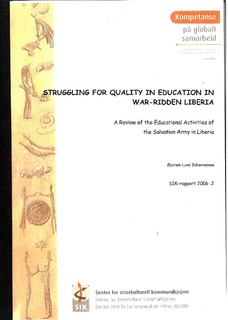| dc.description.abstract | The aim of the evaluation was to describe the present situation at two Norad financed schools; the William
Booth and the New Len Millar, both combined elementary/high schools, as well as the latest developments in the
project of building a teachers training college (TTC) in Monrovia. All three projects are run by the Salvation
Army in Liberia (SA/L). Further the evaluation aimed at assessing the effects and impacts of the two school
projects and the teacher training project. Finally, the aim was to recommend further actions and changes in the
project in order to strengthen the positive effects of the projects on the target group and on education in general,
both regionally and nationally.
The activity at the two schools in question was “impressively normal” in an economic, political and infrastructural
situation which has been far from normal during the last few years. The schools run by SA/L and other
private school owners/operators, contribute to maintaining a minimum level of education in a country where
public education in more or less non-existent. However there are several great challenges confronting SA/L as
well as other actors and stakeholders in the educational sector in offering good, affordable education and still be
able to pay a decent salary to skilled teachers. In the present situation, the two schools have virtually no
pedagical aids or equipment to actualise the content, except for the blackboard, and there is almost a complete
lack of textbooks both for the teachers, the pupils and in school libraries. What the SA/L schools can count on, is
very dedicated and well qualified teachers. However, the danger is real that even this resource can be gradually
lost if the school sector in a near future fails to improve teacher salaries to a level where they can feed a family.
Due to the difficult situation in the country, the building of the teacher’s training college has been delayed, but in
October 2005 it was still scheduled to be completed in 2006. However, the marked situation for teacher training
colleges has been radically altered the last few years. Despite a great need for qualified teachers around the
country, there has been a severe decrease in applicants to existing TTC’s the last few years, probably due to low
income prospects. The advise is therefore that NORAD and SA look into alternative ways of supporting the
education sector in the country and an alternative use of the TTC building that is under construction.
Since the evaluation was completed, Ellen Johnson Sirleaf won the elections. In her presidential program, she
has emphasized the importance of education for all as a means of getting Liberia up and going again. Hopefully,
this means a substantial increase in the budget for education in the nearest future. EU and the World Bank have
signalised that they may be willing to contribute heavily, in the event of political and social stability in the
country. This may lead to new opportunities and challenges for the Salvation Army as a respected and important
actor in the educational sector. | en |
